#now the real question: Does Tuvok REALLY not understand or is he just trying to make [YOU] look gutterbrained??
Explore tagged Tumblr posts
Photo
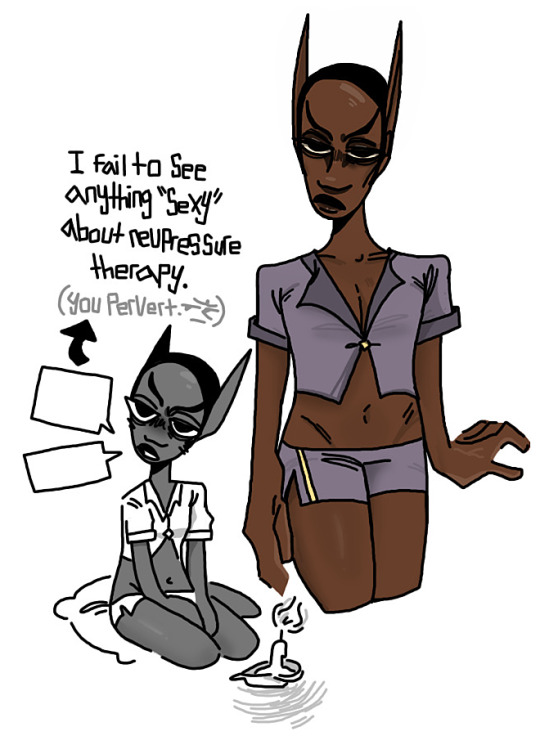
Normal Vulcan Pajamas
#Tuvok#Tuvok art#st voyager#st voyager art#bea art tag#Tuvok in this outfit and lighting candles - turning the lights down low: Literally WHAT is your problem. This is THERAPY.#[Tuvok Voice] Red Alert. -comm badge noise- Captain. We Are Receiving Reports That There Are Indeed Whores Within This House.#Janeway: [tsk] Damn. [stands quickly] Chakotay you're with me. And commander? You're gonna want a bucket and a mop.#now the real question: Does Tuvok REALLY not understand or is he just trying to make [YOU] look gutterbrained??#[YOU] in this case is whatever person he's talking to.#Me - a gay person: Tuvok's hand vein is sooo important its so important its so important guys you don't understand
48 notes
·
View notes
Note
10, 15, 35, 43 for the Trek ask game?
Thank youuuu and sorry for the late answer! Love these questions <3
10. Which alien pet would you most want for your own?
Honestly I have always been very charmed by Worf's childhood pet domesticated targ (portrayed by Russian wild boar Emmy-Lou😂) - but I would happily adopt a Bajoran hara cat, Cardassian vole, or that cute lizard who climbs over Jadzia on the jungle planet
Anyway look at this lil guy!!!
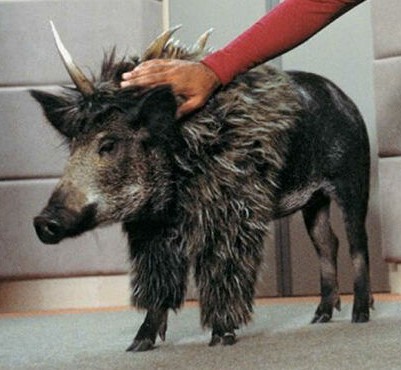
15. Top 3 favorite alien crewmembers?
Oooh, this is tough. Am I choosing my favs overall, or based on how much I like their alien-ness specifically? If it's the former, then Kira, B'Elanna, and Dax - if it's the latter, then Odo, Worf, and Saru (Discovery). (Deanna and Kes leaving you out Hurt Me but they didn't write you alien enough for the latter list!! Still top 5 favs though <3)
35. A minor character you wish had become a main character?
Okay let's talk about the long-form arc potential both Seska and Suder had. Literally my favourite thing about the Suder episodes is the questions about restorative justice they raise- is there any point in locking a man up after he's sincerely reformed and no longer dangerous? Is it possible to be? Is it fair to the victim's loved ones to give him the right to roam around like nothing happened? What sort of thing could count as "reparations" in Voyager's situation? What if they really had been stranded with him for 75 years? Would he ever have been able to move on from what he did? What sort of hobbies might he take up in his new life? What would it take to win Janeway's trust? Would the victim's friends ever forgive him? Would he rather disembark the ship and start anew somewhere, or remain with his own people? Would he have been able to make new friends? Are you reading this string of questions in Jonathan Frakes's voice too? Would our main characters all have been able to get past his actions? Would it cause disagreements? How would his relationship with Tuvok have progressed? What issues would their getting back to Earth early raise for him? ... Aaaaand then the show decided to give us none of that😂 (well. except for Jonathan Frakes in a brief cameo that is :D) As for Seska I really don't know what they were thinking with her lol. She starts off as such a promising villain- literally the "reveal" in 'State of Flux' gives me chills! And you can actually understand her actions, her unexpected attachments to Chakotay and the crew. Instead of the whole pregnancy subplot (which made no sense) I would've loved to have seen her grow increasingly afraid she'd made a mistake in teaming up with the Kazon, and try to defect back to Voyager - the questions that would raise would be similar to Suder's, though in this case a bit more personal for characters like Chakotay and B'Elanna. Is she for real? Is she just doing this to trick them again? How do the Bajoran crew members feel about this? What would it take for her to win back people's trust? Say she does something messed up again, does she get a third chance? Would she make friends with Seven of Nine; someone she never personally betrayed who is also seeking redemption for past actions? Society if we'd gotten her as a regular character all the way till S7 - like an actually great redemption arc, where she ends up on good terms with a lot of them by the end (sort of like what they did with Garak on DS9) - ahhh the possibilities!!!
43. Order of shows from most to least favorite?
This is hard😅 okay I'm going to tier rank them that's easier!
Fav tier: DS9 (It's the best <3) Second tier: TNG (I can't not put it here this show literally changed my life) & VOY (has wonderful characters and has also become very important to me) Third tier: TOS movies (love them), Discovery (I have developed a nostalgia for it by now. Plus Michael is blorbo!) Fourth tier: TOS, SNW, Enterprise, Lower Decks (shows I've enjoyed but only really seen once so far) and I guess the AOS movies lol (imo 'Beyond' is the best one) Fifth tier: Picard (if it was just the first season it would've been higher! I actually liked that one) & the TNG movies (ugh) (I am yet to see TAS and Prodigy)
#thanks again for the ask friend <3#nothing like tier ranking the Starred Trek shows to distract you from feeling sick :)#(nothing serious everyone's just been a bit ill due to water contaminations lol)#also yes. I am aware that we never actually got to see a hara cat on screen#but it is a cat! so#it stands to reason I would like one :)#ask game
3 notes
·
View notes
Text
The illogic of a logical philosophy
The pilot episode of Star Trek: Discovery was titled “The Vulcan Hello,” and Michael Burnham was all about giving one to the Klingons.

Unfortunately, the Vulcan hello she was referring to looked a little less like this:
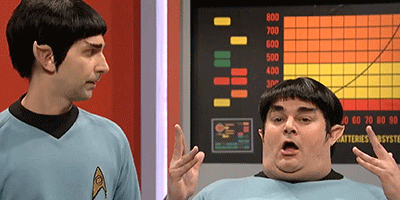
And a lot more like this:

Apparently, this shocked some fans, but I’m not really sure why. There are a lot of perpetuated ideas that Vulcans are strict pacifists because, after all, war is illogical. But if we really peel back some of the canon, the reality is that Vulcans probably prefer peace, but they’re certainly not above violence, and that’s the problem with living by logic.
Is violence illogical? Who’s to say? Even a philosophy based on pure logic is doomed to be convoluted because spoken language is imprecise and no philosophy is absolute. Yet Vulcan philosophy is often treated as though it must be, as if for any single issue, there is only one perfectly logical solution amid a sea of half-logical alternatives and utter irrationality.
So, what is Vulcan philosophy? Over the years, it’s expanded into a belief system that has two giant scoops of Greek stoicism, a pinch of Jewish mysticism, a dollop of utilitarianism, and a rationalism cherry on top. I would actually argue that this Frankenstein philosophy is whatever it needs to be, so long as it can be defended with a reasonably sound argument delivered in monotone, dispassionate speech. And therein lies the problem. How do we decide what is “reasonably sound?” Worse yet, what is logic?
Believe it or not, there is no universal agreement on the exact scope of this particular discipline. The ancient Greeks studied logic in philosophy, but logic also has more discrete applications in mathematics, computer science, and linguistics. I could type thousands of words dissecting the different branches of logic, but Wikipedia did it so much better than I ever could. Bottom line is, if you’re not using logic to defend mathematical proofs or write code, there’s a whole lot of gray area for what can be considered “logical.”
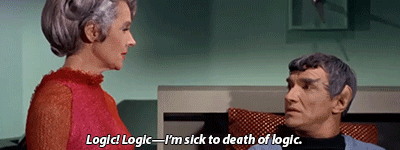
Me too, Amanda, me too.
So how do stoicism, rationalism, and utilitarianism fit into the Vulcan narrative? Stoicism goes back to the ancient Greeks and championed the idea virtue was based on knowledge, and that wise and virtuous people lived in harmony with reason and were able to accept reality and not allow themselves to be controlled by pain, fear, or desire. If that doesn’t sound like the first page of the Vulcan playbook, I don’t know what does.
Rationalism is a philosophy that sort of bridges ancient stoicism with the modern world and asserts that reason should be the chief source and test of logic rather than religious belief or emotional response. And lastly, utilitarianism is a doctrine that asserts that actions are right if they are useful or benefit a majority. Sound familiar?
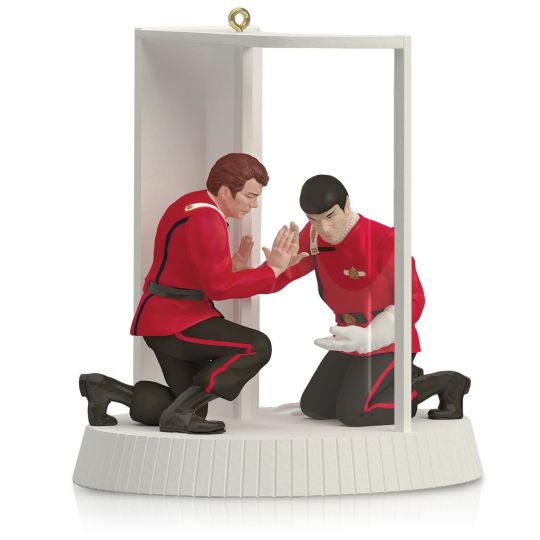
If it doesn’t, you’ve never seen The Wrath of Khan. Or shopped at Hallmark.
But the thing is, not one of those philosophical systems says, “No violence.” If The Teachings of Surak has strict rules prohibiting violence, all the Vulcans we’ve ever met across six different series are really shitty Vulcans.
We see many instances of Vulcans preferring to avoid violence and killing—Vulcans often employ a nerve pinch to subdue aggressors rather than smack them around—but they are capable of worse. In the TOS episode, “Journey to Babel,” a Tellarite ambassador is murdered by someone who “knew exactly where to apply pressure to snap the neck instantly,” according to Dr. McCoy. As Kirk ponders who could have possibly committed such an act, Spock is all too quick to throw his dad under the bus and say, “Vulcans.”
While he quickly adds that “Vulcans do not approve of violence” he also mentions that “it would be illogical to kill without reason.” And so:

Backpedaling at warp eight.
Sarek knows how to kill because he’s skilled in a deadly martial arts technique called tal-shaya. The fact that Vulcans train in martial arts, possess weapons like the lirpa and the ahn-woon, and cruise around the quadrant in ships outfitted with weapons suggests they are at least prepared to defend themselves if necessary, which would disqualify them from being absolute pacifists. But that doesn’t necessarily make them warmongers either.
So, what about actually instigating a war? In Enterprise, we got a view of Vulcans that a lot of people weren’t comfortable with. We saw Vulcans spying on their Andorian neighbors, we saw religious factions fighting one another, and we saw a Vulcan High Command that seemed remarkably belligerent. Some fans might argue that after the discovery of the Kir’Shara in the Enterprise story arc that included the episodes “The Forge,” “The Awakening,” and “Kir’Shara” led to a new reformation, Vulcans returned to their true logical roots, ditching their semi-violent ways.
But it’s evident that Vulcans believe that sometimes logic requires violence. Recall those utilitarian principles woven throughout Vulcan philosophy. One of the most well-known philosophical thought experiments is referred to as The Trolley Problem, and it’s a test of utilitarian judgments. There are many variations, but the short one goes like this:
There’s a trolley hurtling down a track with five people on it. The brakes are shot and it’s going to crash, killing all on board. You happen to be standing next to a switch that would divert the trolley onto a separate track where it would gently crash into a sandbank, saving the lives of those five people. The only problem is, there is a person tied to the tracks you want to divert the trolley onto. If you pull the switch, you will actively kill one person to save five. If you do nothing, you will passively allow the person tied to the tracks to live at the expense of the five on the trolley. And so, if we are capable of acting, do we have a duty to act? (Here’s a fascinating quiz if you’d like to explore your own beliefs on the subject.) But what would Vulcans do?
Rather than spend time debating it, I can tell you exactly what most Vulcans would probably do. In the TOS episode, “Operation, Annihilate!,” Deneva colony is infested with neural parasites and Dr. McCoy can’t find a way to kill them. Kirk is struggling to find a way to prevent the spread of these parasites, and Spock points out the only logical solution, though it is “understandably upsetting,” is to destroy the colony and its one million inhabitants because there are billions of people living beyond Deneva colony to think about. McCoy didn’t handle it well.
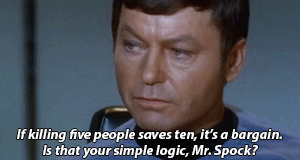
A real dick move, Mr. Spock. A real dick move.
Now, to his credit, Spock was also infected, so he was willing to die for his principles, but he didn’t bat an eye at the idea of killing a million people. The good news is, it’s old-school Trek so of course they found a solution that didn’t end with the tragic slaughter of a million colonists, but Spock’s initial recommendation was that it was logical to commit an act of violence against one million people to save the lives of billions.
Maybe you agree with him, maybe you don’t, but that being said, is it really such a wild notion to believe that the Vulcans would prefer occasional small acts of aggression against the Klingons if there were sufficient reason to believe it would prevent a war?
When explaining to Captain Georgiou what a Vulcan hello was, Michael Burnham didn’t say the Vulcans slaughtered every Klingon they encountered, simply that they “fired first” in order to “say hello in a language the Klingons understood.” If anything, it sounds like the Vulcan policy was more in line with a warning shot than a Klingon genocide, and from my own simple-minded human perspective, that sounds pretty damn logical if it prevents real and prolific bloodshed.
But that comes back to the initial question of “what is Vulcan philosophy?” Perhaps we should ask ourselves who is the ultimate judge of what is logical? In theory, it should be Surak and his teachings, right?
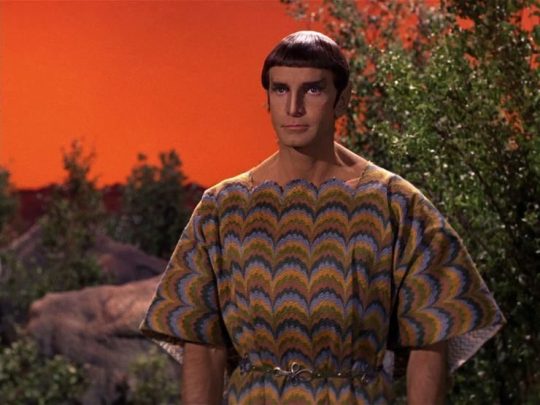
Surak’s a smart guy who obviously knows a bargain when he sees one, as illustrated by this ensemble that looks a 6th grade home economics project met the clearance rack at the local craft store.
Unfortunately, just because something is written down doesn’t mean everyone is going to agree on the same interpretation, otherwise, the U.S. Supreme Court would be about 99% less busy and history wouldn’t be littered with the bodies of billions of people desperate to prove their version of the God of Abraham is the right one.
I don’t know why Vulcans are so often portrayed as being a culture of homogenous personalities, beliefs, and values, as though logic is logic and there’s no room for variation. Imagine what the series would have been like if we played switcheroo with Spock, Tuvok, and T’Pol. Picture the moody and somewhat emotional T’Pol trying to give advice to Captain Kirk, or the wise and experienced Tuvok trying to talk Archer out of half the shit he did in the Delphic Expanse.

Tuvok’s eyes are clearly asking if it’s too late to go back to the Delta quadrant and get assimilated by the Borg.
The point is, individual Vulcans aren’t interchangeable, and I don’t think their beliefs are either. Just look at what happened in the Enterprise episode, “Carbon Creek.” Three Vulcans are marooned on Earth in the 1950s and are facing starvation when they encounter a pair of deer. Despite the fact that Vulcans eat plant-based diets because their tenets about non-violence extend to animals, Mestral suggests eating one of them because:
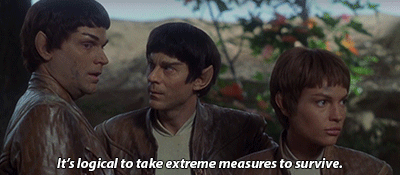
A Vulcan Mrs. Donner.
Stron is Vulcan-horrified at the idea of resorting to “savagery,” but thankfully T’Pol/T’Mir agrees to violate the Vulcan version of the Prime Directive instead so they don’t have to murder Bambi’s mom. But that scene raises an interesting point. Who was right, Mestral or Stron? Or both? Or neither?
Put 100 Vulcans in a room and ask them when war is justifiable, I’m sure they’d all spout off some Vulcan version of Just War Theory like the smug, walking information databases that they are. But put 100 Vulcans in charge of making a real-world decision about going to war, and we’d get 100 different answers, some which directly contradicted others, but each defended by iron clad logic.
To wrap this drivel up, Vulcan philosophy is a really bizarre hodgepodge of conflicting ideologies. They believe in infinite diversity in infinite combinations, which means they celebrate the beauty of the countless variables of the universe, unless it’s a Klingon bird-of-prey, in which case, they shoot that shit up. Pacifism is great when it’s convenient, killing is bad, except for when it isn’t, it’s not genocide if you have a really good reason, and eating animals is wrong, except for when it’s necessary. Yeah, logical.
I’m of the opinion that Vulcans are no better than humans—they do their best to grapple with complex issues according to a chaotic and occasionally contradictory set of beliefs. Even if they swear they aren’t driven by emotion, they are still at the mercy of their life experiences and world views when it comes to decision making. Logic is a tool that can help them arrive at answers, but it isn’t the answer. Most importantly, like any tool, logic can be abused or corrupted.
Given the weight of the evidence, I would re-assert that Vulcans are happy to declare anything as being logical, so long as it suits their agenda or personal beliefs. Or perhaps it’s better to say that the writers of Star Trek will call anything logical if it adds to the dialogue or advances the plot.
What say you, T’Pol?

#star trek#star trek discovery#star trek enterprise#star trek the original series#vulcans#vulcan philosophy#spock#t'pol#tuvok#meta#long post#live long and prosper
191 notes
·
View notes
Text
753. [VOY] Renaissance Man
SCORE:

(4/5 stars)
The Doctor and Janeway are returning to Voyager on the Delta Flyer from a conference. But Voyager receives a transmission from Janeway on the Flyer routed through the deflector array stating that their comm system is in disrepair and they had to use the deflector, and for Chakotay to meet her in her ready room as soon as she's aboard. She explains that they had a run-in with an alien species who controls a territory spanning all the way to the Beta Quadrant with technology decades ahead of their own, and they demand that Voyager hand over its warp core and settle on a planet in the territory. Chakotay is surprised at how easily Janeway is laying down for these demands and how she's leaving him so in the dark.
Janeway asks B'Elanna to modify the Delta Flyer's tractor beam to be able to tow the warp core safely. Torres is confused and asks Chakotay about what's going on. Chakotay asks the Doctor to run an exam on Janeway because he's concerned about her behavior, and then goes to Astrometrics to ask Seven to scan for any cloaked ships like the type Janeway described. Seven isn't finding any, but they do receive a transmission from the species demanding they remand the warp core within ten hours or they will be destroyed.
Janeway has been kidnapped by two rogue Hierarchy officers and they've tapped into the Doctor's program, allowing them to see and hear everything he does. They're forcing him to deliver Voyager's warp core to them or they'll kill Janeway. She is insisting that he not comply, but he doesn't want to risk her death and carries on with his mission. In addition to the warp core, they demand some gel packs. The Doctor lures B'Elanna out of Engineering so he can go in there posing as her to grab some spares, but he's surprised by Tom, who's been trying to get B'Elanna to have a picnic with him somewhere because the baby is due any day and they'll never be alone again. The Doctor gets him to agree to dinner that night to deflect, and has to sit there and take it when Tom kisses him.
Harry calls Chakotay (the Doctor has hidden his combadge under a sleeve) and he poses as Chakotay to visit Holodeck 2, where Harry is able to determine the transmission from the "aliens" was actually sent and generated from here. He's able to even reconstruct that it was the Doctor behind it, which leaves the Doctor with another unconscious body to hide in the morgue. He tries to unwind with some music in sickbay, but is confronted by Tuvok, who sees that Janeway's holographic pattern had been accessed immediately before the deflector array transmission. Tuvok is able to block the Doctor's hypospray and begins shooting out holoemitters in Sickbay. The Doctor turns intangible and runs for his holoemitter, escaping the room with it attached.
Tuvok chases him down to the Holodeck, where he has filled the room with copies of himself. While Tuvok attempts to ascertain which one is real, the real one is making his escape in the Jefferies tube heading for engineering, where he poses as Chakotay and orders everyone to evacuate because the warp core is about to breach. Torres says all readings are fine, but "Chakotay" says the Doctor is interfering with the computer displays. She gets everyone out but wants to stay with Chakotay to help save the core before he says she shouldn't risk the baby. She's about to leave when Paris warns her over the intercom that the Doctor's emitter is in Engineering. The Doctor seals her inside a force field, and activates the ECH protocols which allow him to eject the core.
Tuvok tracks the Doctor to a Jefferies tube heading for the shuttlebay. The Doctor poses as Torres but Tuvok doesn't buy it. Unfortunately for Tuvok, the Doctor is on fucking point today and pulls a wall-run to get behind him and phaser-stuns him. He gets away with the Delta Flyer and the warp core, and Voyager is left without main power to stop him. The Doctor rendezvous with the Hierarchy renegades and demands they beam Janeway to her, but they fire on him instead to get him to release the tractor beam and then beam him aboard their vessel. After his impressive performance on Voyager, they're going to use him to steal even more stuff.
Tom finds Chakotay and Harry in the morgue and revives them. With no sign of Janeway anywhere, Tuvok deduces she probably never made it back to the ship. When they're able to restore main power, a recording of the Doctor playing the Blue Danube waltz at a recital plays on all comm frequencies, with several errors in the recording. They remember that he played without error, and are able to analyze the flaws to determine he's hidden the warp frequency of the Hierarchy ship in the song. Tuvok and Tom can follow its signature in one of the shuttles.
On the Hierarchy ship, Janeway has managed to slowly ingratiate herself to the subordinate officer with flattery while his superior does nothing but insult him. They load the Doctor's matrix with data and holomatrix parameters for their next heist, but it's too much data and begins destabilizing his matrix. Tom and Tuvok catch up to the ship and Tom beams aboard. After a struggle, the underappreciated subordinate turns on his superior and the warp core, Janeway and the Doctor are returned to Voyager.
Because of his matrix destabilization, it's not certain the Doctor will survive, and while Seven and Torres work to save him on the holodeck, he begins acting as though this is his final moments, and begins confessing embarrassing secrets that have weighed on his conscience, such as keeping a file on Janeway's orders he disagreed with, mocking Harry's clarinet skills, telling Neelix about Tuvok's rash, and biggest of all confessing love for Seven (which she brushes off as his cognitive processes malfunctioning). He vanishes, but then returns. Torres just had to turn him off and back on again. He sulks in Sickbay for the next week after that embarrassing display, and Janeway shows up to dole out punishment for his insubordination in stealing the warp core: a week without his mobile emitter, which she calls time served since he's not left Sickbay in that long. She invites him to the holodeck for coffee.
NITPICKS
The Doctor's bluff about the species that believes warp travel is damaging to subspace would be a lot more convincing if A. they didn't control literally thousands of light years of territory (how are they patrolling it and not being hypocrites?) and B. Voyager's warp drive was specifically designed to eliminate damage to subspace.
This episode really exemplifies the missed opportunities with the Doctor that can really be blamed mostly on A. lack of creativity from the writing staff, and B. a special effects budget. When the Doctor ran through the table, it just raises the question of why did we never see him reach his hands inside someone to perform surgery?
If the Doctor doesn't need the mobile emitter to be on his shoulder, why would he continually place it there, where it's openly visible and vulnerable?
FAVORITE QUOTES
Doctor: I didn't wake you, did I? Janeway: That's all right, Doctor. Fifteen minutes of sleep is really all I need.
Doctor: Computer, access Lieutenant Torres' holographic template and download the physical parameters into my program. [He makes the changes then realizes he's missing the baby bump.] Doctor: Computer, access medical file Torres Three and update her holographic template.
Doctor: I've had something on my conscience for a long time. After I was first activated, I kept a record of what I considered to be your most questionable command decisions. It's in my personal database. I hope you'll delete the file without reading it. Mister Tuvok, I violated the most sacred trust between a physician and his patient. I told Mister Neelix about the cutaneous eruption you developed on your... that was indiscreet. I hope you can forgive me. Ensign, at your recital last month, I told Lieutenant Torres that your saxophone playing reminded me of a wounded targ. I should've put it more delicately. I'm sorry. Seven. Seven: You should remain still. Doctor: You have no idea how difficult it's been, hiding my true feelings all these years, averting my eyes during your regular maintenance exams. I know you could never have the same feelings for me but I want you to know the truth. I love you, Seven. Seven: Your cognitive algorithms are malfunctioning. Doctor: Goodbye, my friends. Speak well of me. [The EMH disappears.] Janeway: Is he...? Torres: No, I've got him. [The Doctor reappears.] Doctor: What happened? Torres: I deleted the extraneous subroutines. Doctor: I'm not going to decompile? Janeway: You'll probably outlive us all. Paris: Doc, anything else you'd like to confess?
Janeway: Now, when you're on the holodeck with the captain, there are two rules you have to follow. Doctor: I understand. Janeway: First, leave your rank at the door. Doctor: Not a problem. The second? Janeway: No opera.
#star trek#voyager#voy#chronotrek#chronological#review#renaissance man#the doctor#emh#holograms kick ass yo
1 note
·
View note